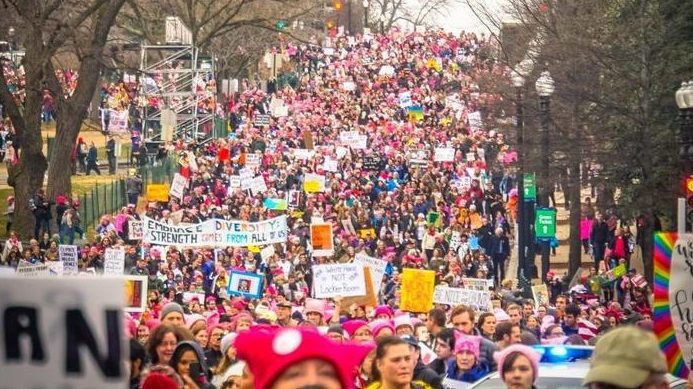
Close to a million women and men assembled for the Women’s March on Washington on January 21, with corresponding marches held simultaneously in most major cities across the U.S. and across the globe. At the end of the day, media reports stated there were corresponding marches on all five continents with several million women standing together in solidarity.
The march, which occurred the day after the presidential inauguration, was intended to highlight and advance such important women’s issues as equal pay for equal work, ratification of the Equal Rights Amendment (ERA), access to reproductive services, as well as the perceived failure to advance issues important to women – especially for those in minority and disadvantaged groups. Another unifying theme was an effort to counter the negative rhetoric that was so strongly advanced during the presidential election.
The Women’s March on Washington movement grew out of the frustration among many women who spontaneously banded together to create a venue for voicing their concerns. The organization lists its principal mission as, “We stand together in solidarity with our partners and children for the protection of our rights, our safety, our health, and our families – recognizing that our vibrant and diverse communities are the strength of our country.”
Furthermore, the organization defined is goals and objectives with the following statement: “In the spirit of democracy and honoring the champions of human rights, dignity, and justice who have come before us, we join in diversity to show our presence in numbers too great to ignore. The Women’s March on Washington will send a bold message to our new government on its first day in office, and to the world, that women’s rights are human rights. We stand together, recognizing that defending the most marginalized among us is defending all of us.”
The organizers and marchers hoped to highlight issues related to ending violence against women, confronting initiatives that reduce or deny access to reproductive services, advancement on the rights of LGBT and minorities, confronting the erosion of worker’s rights, enhancing services and access for the disabled, protecting civil rights, and protecting the environmental.
A topic of special interest to women is related to economics and the fact that inequality systematically traps women in poverty and second-class citizenship. Women already have a multitude of challenges to face, be it at home, in the work place, or socially. Women still earn .77 cents on average of every dollar men earn, by doing the same work, with the same qualifications. That amounts to estimated lost earnings of about $500,000 for a high-school graduate, $1 million for a college graduate, and $2 million for a graduate-degree holder. As more households are led by single women and their children, the income inequality, and low wages become a burden. We stand by as more qualified women are continually overlooked, as men with less experience get promotions or more a desired positions.
This level of frustration and the accumulation of a multitude of issues important to women served as a catalyst for millions to come out together and march so that their daughters, granddaughters, sisters, nieces, friends, and co-workers might have better prospects and greater equality in a just society; one in which their chances of a obtaining a good job and good salary are based solely on their qualifications – not gender.
Please send any comments via email to: Daisy.Baez@myfloridahouse.gov.






